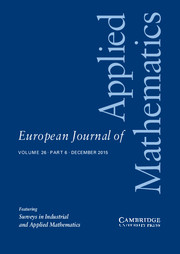Article contents
A singularly perturbed boundary-value problem arising in phase transitions
Published online by Cambridge University Press: 30 January 2007
Abstract
This paper is concerned with the positive solutions of the boundary-value problem \[ \left\{{\begin{array}{@{}l@{}}{\varepsilon u^{''} - \sigma (u) = -\gamma,}\\{u(0) = u(1) = 0,}\\ \end{array}}\right.\] where $\varepsilon$ is a small positive parameter and $\gamma$ is a positive constant. The nonlinear term $\sigma(u)$ behaves like a cubic; it vanishes only at $u=0$, where $\sigma'(0) > 0$ and $\sigma''(0) < 0$. This problem arises in a study of phase transitions in a slender circular cylinder composed of an incompressible phase-transforming material. Here, we determine the number of solutions to the problem for any given $\gamma$, derive asymptotic formulas for these solutions, and show that the error terms associated with these formulas are exponentially small, except for one critical value of $\gamma$. Our approach is again based on the shooting method used previously by Ou & Wong (Stud. Appl. Math.112 (2004), 161-200).
- Type
- Papers
- Information
- Copyright
- 2007 Cambridge University Press
- 3
- Cited by




